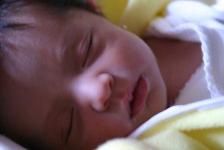With Bronchiolitis Season in Full Swing, New Insights into Factors Affecting Severity
Although bronchiolitis is commonly seen in very young children, the infection can be dangerous and even fatal for some infants. Here, new thoughts on risk factors that may determine which babies get very sick.
A Quick Quiz on Bronchiolitis
Although it is one of the most common lower respiratory tract infections of very young children, bronchiolitis can be dangerous and even fatal for some infants.

There are different, perhaps previously unappreciated, factors that can make otherwise healthy children sick enough to require intensive care. The authors of a recently published study of risk factors that predispose to severe disease found that compared with infants who weather the bronchiolitis storm well, those who become seriously ill share certain distinguishing characteristics:
• They are smaller, younger (<3 months), and more likely to have been delivered by cesarean section. The younger the infant, the more likely he or she is to require admission to the pediatric ICU.
• Their hemoglobin, sodium, and lymphocyte counts are lower, and gamma-glutamyl transpeptidase (GGT) levels are higher.
• Their chest films show more pulmonary consolidation and/or atelectasis. Infants with the most consolidation/atelectasis have the highest serum levels of C-reactive protein.
Patient selection
Papoff and colleagues1 followed 310 infants younger than 12 months of age who were having a first episode of bronchiolitis. Infants were selected over 5 epidemic seasons so that an adequate sample size could be collected while minimizing the effect of changing standards of care. Unlike other studies of bronchiolitis, all infants were otherwise healthy; the investigators excluded those who were premature, extremely young (younger than 37 weeks) or underweight (<2000 g at birth), or compromised by congenital heart disease or immunodeficiency. Infants were sorted into 4 groups based on severity of illness--ranging from needing no oxygen or fluids, to requiring fluids and/or oxygen or mechanical ventilation/noninvasive respiratory support. Epidemiologic, clinical, demographic, radiologic, and laboratory data were evaluated with respect to these groupings.
The investigators found that epidemiologic factors such as maternal smoking, family incidence of atopy, and breastfeeding, had no significant bearing on severity of bronchiolitis. This effect could have been related to the general good health of the children studied.

The investigators also performed viral analysis on nasal washings from each child. There were a variety of causative viruses, but respiratory syncytial virus (RSV) was most common. Children most susceptible to RSV were those with pulmonary consolidation/atelectasis or high levels of C-reactive protein.
Most of the infants in the study were admitted to intensive care right from admission, suggesting that in healthy infants who are carried to term, severe bronchiolitis probably develops too early to be predicted or prevented.
Reference
Papoff P, Moretti C, Cangiano G, et al. Incidence and predisposing factors for severe disease in previously healthy term infants experiencing their first episode of bronchiolitis. Acta Paediatr. 2011;100:e17-e23.
The Role of the Healthcare Provider Community in Increasing Public Awareness of RSV in All Infants
April 2nd 2022Scott Kober sits down with Dr. Joseph Domachowske, Professor of Pediatrics, Professor of Microbiology and Immunology, and Director of the Global Maternal-Child and Pediatric Health Program at the SUNY Upstate Medical University.
Overview of biologic drugs in children and adolescents
March 10th 2025A presentation at the 46th National Association of Pediatric Nurse Practitioners (NAPNAP) conference explored the role of biologics in pediatric care, their applications in various conditions, and safety considerations for clinicians.